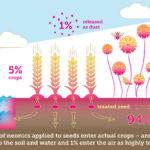 The tale of neonicotinoids is developing more nuanced. Europe has prohibited outside utilization of three of these bug sprays to secure honey bee populaces. Two different neonicotinoids are still allowed, yet little is thought about their effect on honey bees. New research revealed in ACS’ Environmental Science and Technology on one of the allowed neonicotinoids shows it adequately controls bugs and may even support honey bees.
The tale of neonicotinoids is developing more nuanced. Europe has prohibited outside utilization of three of these bug sprays to secure honey bee populaces. Two different neonicotinoids are still allowed, yet little is thought about their effect on honey bees. New research revealed in ACS’ Environmental Science and Technology on one of the allowed neonicotinoids shows it adequately controls bugs and may even support honey bees.
Neonicotinoids are broadly used to protect crops from creepy crawlies that can annihilate them. A portion of these harvests profit by fertilization, however pesticide treatment can uncover honey bees and other helpful creepy crawlies to deposits in dust and nectar. The introduction can murder honey bees or weaken themfor model, by reducing their scavenging abilitiescontributing to decreases in honey bee populaces. This result prompted the boycott of three high-chance neonicotinoid bug sprays in Europe. Maj Rundlöf and Ola Lundin needed to know whether honey bees and the blooming crops they use for nourishment would be in an ideal situation with or without the utilization of one of the less-hurtful neonicotinoids.
In a field study, the specialists found that applying the neonicotinoid thiacloprid on red clover had no detectable negative impacts on honey bees. The thiacloprid treatment viably controlled nuisances and expanded honey bee crop appearance. Be that as it may, if this neonicotinoid weren’t accessible, ranchers may supplant red clover with other nonflowering yields less delicate to bug pervasions, the scientists contemplated. So the group additionally analyzed honey bee execution in scenes lacking red clover. They found that honey bee states close thiacloprid-treated red clover fields became heavier (with more hatchlings, honey bees and nourishment stores in them) contrasted with settlements in scenes without red clover. As per the analysts, the examination shows that certain neonicotinoid bug sprays still allowed in the European Union may profit honey bees by exhibiting an okay to the honey bees while ensuring blossoming crops as a significant nourishment source.
The scientists likewise state that neonicotinoid bug sprays ought not be considered as a homogeneous gathering when leading danger appraisals.
More data:
“Can Costs of Pesticide Exposure for Bumblebees Be Balanced by Benefits from a Mass-Flowering Crop?” Environmental Science and Technology (2019). pubs.acs.org/doi/abs/10.1021/acs.est.9b02789
Reference:
On balance, some neonicotinoid pesticides could profit honey bees: study (2019, November 27) recovered 27 November 2019 from https://phys.org/news/2019-11-neonicotinoid-pesticides-advantage bees.html
This record is liable to copyright. Aside from any reasonable managing with the end goal of private examination or research, n part might be recreated without the composed authorization. The substance is accommodated data purposes as it were.

